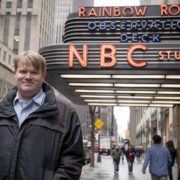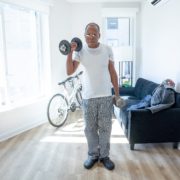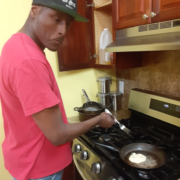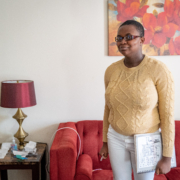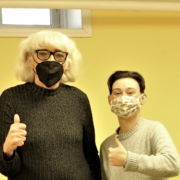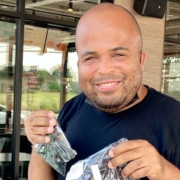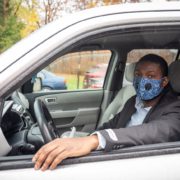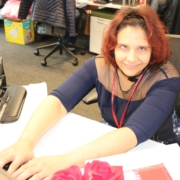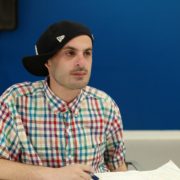As part of The Foundling’s Developmental Disabilities Residential program, Jason has been surrounded by community and support. When Vital Brookdale, our purpose-built supportive housing complex, opened recently in Brownsville, Brooklyn, Jason was able to upgrade to a brand-new 1-bedroom apartment, giving him a beautiful space to call his own as well as support from on-site Foundling staff. And, this past summer, he was able to secure a job working for NBC!
David was used to having others manage his life. When he came to The Foundling for the first time 16 years ago— as a resident in one of our Brooklyn homes for people with developmental disabilities—he soon learned that he could achieve more than he ever thought possible.
With the support of The Foundling, he has learned life skills, improved his health, and found independence. Faced with medical concerns, our residential staff helped him manage his own health—administering his own medications, changing his diet, and introducing exercise into his daily routine. He was also encouraged and supported in taking public transportation, allowing him to integrate into his community and gain autonomy. This past summer, he moved into his own apartment at our Vital Brookdale complex in Brooklyn— where he is set to build a lifetime of memories and accomplishments.
The Foundling employs a full-time Nutrition team to ensure that the residents in our homes for people with developmental disabilities stay healthy – from nutritious meal planning to regular exercise courses. Across all of our 104 supportive residences, staff and residents are encouraged to try new recipes and bolster their cooking skills. With the help of our dedicated staff, Vernon, who lives in one of our residences in Brooklyn, learned to cook his own healthy meal of oatmeal blueberry pancakes! Not only is he learning skills for independence, but is achieving the tools and mindset to stay healthy for years to come.
For many people with developmental disabilities, it can be difficult to express oneself through language and actions. In our Day Habilitation programs, we work to elevate the voices of our participants, and provide them with meaningful tools for self-expression and fulfillment. Through art workshops – from photography to poetry – many of our participants found that art provided a novel way to truly share their voices and experiences with the world. “Art makes me feel terrific and excellent,” says Elizabeth, who shared many of her photographs in our 2022 art exhibition. “I feel happy. I learned about myself.”
As a person with developmental disabilities living in one of our residences, Adeola faced a number of difficulties in achieving her goals. Like many young people, Adeola has always wanted to find employment, go to college, and become independent—but she struggled to find pathways to achieve this on her own. Over the past three years, however, she’s discovered an incredible support system within The Foundling—and her future is bright.
After a year and a half of intensive training in our Employment Services program, she now works part-time as an Administrative Assistant. The program continues to influence her continued success— Foundling staff continue to provide workplace guidance, and encourage her in her academic goals. Adeola is attending college full-time, working toward her bachelor’s degree in Disability Studies – and she’s succeeding in the final year of her studies. As an aspiring artist, she hopes to one day teach art to others.
As a transgender woman with developmental disabilities, Michelle had spent most of her life struggling to access the gender-affirming care she needed. But after coming to live at one of our supportive residences two years ago, she was finally able to take the steps to live as her true self. The dedicated Foundling staff at Michelle’s home provided her with crucial support throughout her transition process – helping her navigate the healthcare system, update her identification documents, and more. When asked to provide advice for others in the LGBTQ+ community, she shared that it’s important to “make sure they have the right people around to help.” At The Foundling, Michelle found just that – and is now on her way to living her best life and reaching her full potential!
Lowell, who lives in one of our Bronx residences for people with developmental disabilities, knew he wanted to work. However, people with disabilities have some of the lowest employment rates in the country, and it was difficult for him to achieve this goal. Years passed without any progress – until he enrolled in The Foundling’s Employment Services in 2018. The program was exactly what he was looking for. Matched with a supportive coach, he began to learn the basics of being in the workforce. He embarked on dedicated skills training, and received expert guidance as he identified jobs that fit with his interests and aptitudes. Through several volunteer positions in the community, he learned how to follow directions and conduct himself in the workplace. While some skills took some time to master, and the COVID-19 pandemic posed further disruptions, Lowell continued to have hope. He never gave up on his goal – and neither did his Foundling job coach. This summer, those efforts paid off as he accepted his first job as a team member with Shake Shack, working at a location in the Bronx! Now, he starts his days with purpose, and enjoys doing meaningful paid work in the community. With The Foundling’s continued partnership, Lowell has a bright future ahead.
Shawn was diagnosed with a developmental disability as a child, making everyday tasks difficult. Since 2011, he has lived at a supportive Foundling residence in Rockland County, and for the past five years, has received additional skills training through our Community Habilitation program. Given his disability, he faces numerous challenges in daily life – but with The Foundling providing a helping hand, Shawn has made tremendous strides toward independence.
For Shawn, learning to drive has been one of his personal goals for more than five years, though he hadn’t yet succeeded in passing his permit test. When Shawn’s routine was upended during the pandemic, he took a renewed approach to studying, while being supported by his Foundling Community Habilitation Specialist. Together, they reviewed sample tests and went on the road to practice concepts firsthand. In September, Shawn took the exam again—and passed with a perfect score. He now looks forward to beginning driving lessons and pursuing the new opportunities that a license will bring. With The Foundling helping him navigate, Shawn looks forward to steering the way toward further independence.
As a Program Assistant at The Foundling, Nancy ensures that her floor is organized and running smoothly, and her tasks help her coworkers work effectively and efficiently. It’s Nancy’s first paying job, and she loves every moment of it. She has worked hard to achieve this level of independence: Nancy has lived in one of our supportive residences since 2004, and always felt like she could do more in her life. A few years ago, Nancy joined our Employment Services Program, where she had the opportunity to volunteer at numerous organizations and learn workplace skills. Now, she appreciates the independence and sense of purpose that employment provides.
Michael, who has lived in a Foundling residence since 2014, has made great strides in his path toward independence and personal growth. With the help of caring staff both at his home and within our Day Habilitation program, he has overcome behavioral challenges over the past 6 years, and is now taking charge of his future. He enjoys watching movies, spending time with housemates and staff, and is taking on progressively harder tasks around the home, including yard work, grocery shopping, and cleaning. Michael continues to grow and pursue new opportunities and interests, and he’s also actively looking for a full time job.

